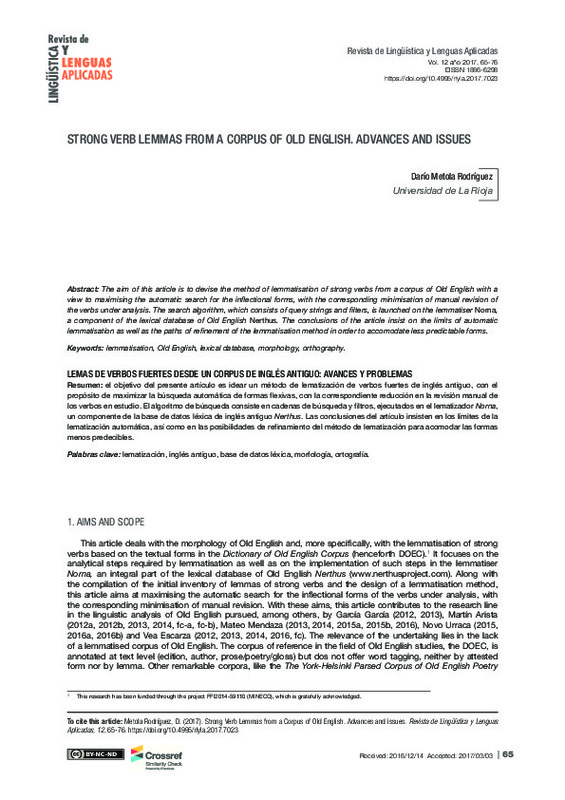Bosworth, J. and Toller, T. N. 1973 (1898). Anglo-Saxon Dictionary. Oxford: Oxford University Press.
Brinton, L. J., & Traugott, E. C. (2005). Lexicalization and Language Change. doi:10.1017/cbo9780511615962
Campbell, A. 1987 (1959). Old English Grammar. Oxford: Oxford University Press.
[+]
Bosworth, J. and Toller, T. N. 1973 (1898). Anglo-Saxon Dictionary. Oxford: Oxford University Press.
Brinton, L. J., & Traugott, E. C. (2005). Lexicalization and Language Change. doi:10.1017/cbo9780511615962
Campbell, A. 1987 (1959). Old English Grammar. Oxford: Oxford University Press.
Clark Hall, J. R. 1996 (1896). A Concise Anglo-Saxon Dictionary. Toronto: University of Toronto Press.
DE LA CRUZ, J. M. (1975). OLD ENGLISH PURE PREFIXES: STRUCTURE AND FUNCTION. Linguistics, 13(145). doi:10.1515/ling.1975.13.145.47
García García, L. (2012). Morphological Causatives in Old English: the Quest for a Vanishing Formation1. Transactions of the Philological Society, 110(1), 122-148. doi:10.1111/j.1467-968x.2012.01287.x
García García, L. (2013). "Lexicalization and morphological simplification in Old English jan-causatives: some open questions". Sprachwissenschaft, 38/2: 245-264.
Hogg, R. M. (2011). A Grammar of Old English. doi:10.1002/9781444341355
Hogg, R. M. (Ed.). (1992). The Cambridge History of the English Language. doi:10.1017/chol9780521264747
Krygier, M. (1994). The Disintegration of the English Strong Verb System. Frankfurt am Main: Peter Lang.
Levin, S. R. (1964). A Reclassification of the Old English Strong Verbs. Language, 40(2), 156. doi:10.2307/411574
Mailhammer, R. (2006). "On the origin of the Germanic strong verb system". Sprachwissenschaft, 31/1: 1-52.
Mailhammer, R. (2007). The Germanic Strong Verbs. Trends in Linguistics. Studies and Monographs [TiLSM]. doi:10.1515/9783110198782
Mailhammer, R. (2008). The Typological Significance of Ablaut in the (Pre-)history English. In W. Rudolf, T. Honegger and A. J. Johnston (eds.), Clerks, Wives, and Historians: Essays on Medieval English Language and Literature. Bern: Peter Lang, 185-212.
Arista, J. M. (2012). The Old English Prefixge-: A Panchronic Reappraisal. Australian Journal of Linguistics, 32(4), 411-433. doi:10.1080/07268602.2012.744264
Arista, J. M. (2013). Recursivity, Derivational Depth and the Search for Old English Lexical Primes. Studia Neophilologica, 85(1), 1-21. doi:10.1080/00393274.2013.771829
Martín Arista, J. (2014). "Noun layers in Old English. Asymmetry and mismatches in lexical derivation". Nordic Journal of English Studies, 13/3: 160-187.
Martín Arista, J. "El paradigma derivativo del inglés antiguo". Onomazeín. Forthcoming-a.
Martín Arista, J. "The Semantic Poles of Old English. Towards the 3D Representation of Complex Polysemy". Digital Scholarship in the Humanities. Forthcoming-b.
Martín Arista, J., & Cortés Rodriguez, F. J. (2014). From directionals to telics. Theory and Practice in Functional-Cognitive Space, 229-250. doi:10.1075/sfsl.68.10mar
Mateo Mendaza, R. (2013). The Old English Exponent for the Semantic Prime TOUCH. Descriptive and Methodological Questions. Australian Journal of Linguistics, 33(4), 449-466. doi:10.1080/07268602.2013.857574
Mateo Mendaza, R. (2015a). "Matching productivity indexes and diachronic evolution. The Old English affixes ful-, -isc, -cund and -ful". Canadian Journal of Linguistics. 60/1: 1-24. https://doi.org/10.1017/S0008413100000517
Mateo Mendaza, R. (2015b). "The search for Old English semantic primes: the case of HAPPEN". Nordic Journal of English Studies, 15: 71-99.
Mateo Mendaza, R. (2016). The Old English Exponent for the Semantic Prime MOVE*. Australian Journal of Linguistics, 36(4), 542-559. doi:10.1080/07268602.2016.1169976
Novo Urraca, C. (2016). Old English Suffixation: Content and Transposition. English Studies, 97(6), 638-655. doi:10.1080/0013838x.2016.1183955
Novo Urraca, C. (2016). Morphological Relatedness and the Typology of Adjectival Formations in Old English. Studia Neophilologica, 88(1), 43-55. doi:10.1080/00393274.2016.1150788
Prokosch, E. (1939). A Comparative Germanic Grammar. Philadelphia: University of Pennsylvania.
Sweet, H. 1976 (1896). The Student's Dictionary of Anglo-Saxon. Cambridge: Cambridge University Press.
Vea Escarza, R. (2012). Structural and Functional Aspects of Morphological Recursivity. NOWELE, 64-65, 155-179. doi:10.1075/nowele.64-65.09esc
Vea Escarza, R. (2014). Split and unified functions in the formation of old English nouns and adjectives. Revista de Lingüística y Lenguas Aplicadas, 9(1), 106. doi:10.4995/rlyla.2014.2086
Vea Escarza, R. (2015). Recursivity and Inheritance in the Formation of Old English Nouns and Adjectives. Studia Neophilologica, 88(1), 1-23. doi:10.1080/00393274.2015.1049830
Vea Escarza, R. (2016). "Old English affixation. A structural-functional analysis". Nordic Journal of English Studies. 15(1): 101-119.
[-]








